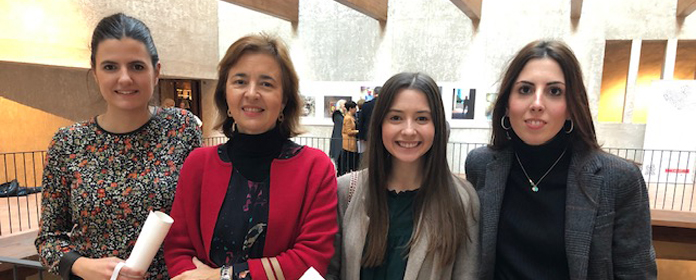Two Tomás Belzunegui prizes for an end-of-year work Degree in Nutrition and a work of doctorate on ageing and antioxidant nutrition.
The awards went to a student of Degree and three doctoral students directed by Amelia Martí, professor of Physiology and Food Sciences of the University of Navarra ( department ).

PHOTO: Courtesy
Ana Ojeda, Lydia Morell and Lucía Alonso -students of doctorate of the department of Physiology and Food Sciences of the School of Pharmacy of the University of Navarra-, and the student of Degree Francesca Fortique, directed by the researcher Amelia Martí, received recognition in the last Tomás Belzunegui Awards for their work on aging and healthy eating.
In a ceremony held at the Palacio de Condestable in Pamplona, the Society of Geriatrics and Gerontology of Navarra made submission of the awards to the graduate of Human Nutrition and Dietetics Francesca Fortique for her work end of Degree on cognitive impairment and consumption of Omega-3 fatty acids.
A chapter of the book graduate "Aging, telomere integrity and antioxidant food" from the book "Obesity: Oxidative Stress and Dietary Antioxidants", edited by the professor of the School of Pharmacy and Nutrition Amelia Martí del Moral -researcher of CIBERobn, of the high school Navarro de research Sanitaria (IDISNA) and director of GENOI (group de Estudio Navarro de la Obesidad Infantil- and M. Concepción Aguilera, professor at the University of Granada.
Acting on telomeres to prevent agingThe award at work from doctorate went to Ana Ojeda, Lydia Morell and Lucía Alonso. According to the latter, a PhD student at department in Health Sciences at the academic center, in their work "Aging, telomere integrity and antioxidant food" they wanted to explain that aging "is a natural biological process, dependent on time and the physiological functions of multiple organs and tissues present in biological systems. Telomeres, which are the ends of chromosomes responsible for protecting our genetic material, play a key role in this process".
"Telomeres," adds the future doctor, "shorten progressively as cell division occurs, a process compensated by the enzyme telomerase, which is capable of lengthening telomeres. Certain risk factors, such as alcohol or tobacco, produce oxidative stress and inflammation in the body, accelerating telomere shortening.
"programs of study show that a healthy lifestyle and a per diem expenses rich in antioxidants and vitamins helps to reduce the risk of developing certain pathologies associated with aging, such as cardiovascular disease, neurodegenerative diseases or cancer," concludes the researcher, whose award collected her director of thesis , Dr. Amelia Martí, from the hands of the dean of the School, Adela López de Cerain.
